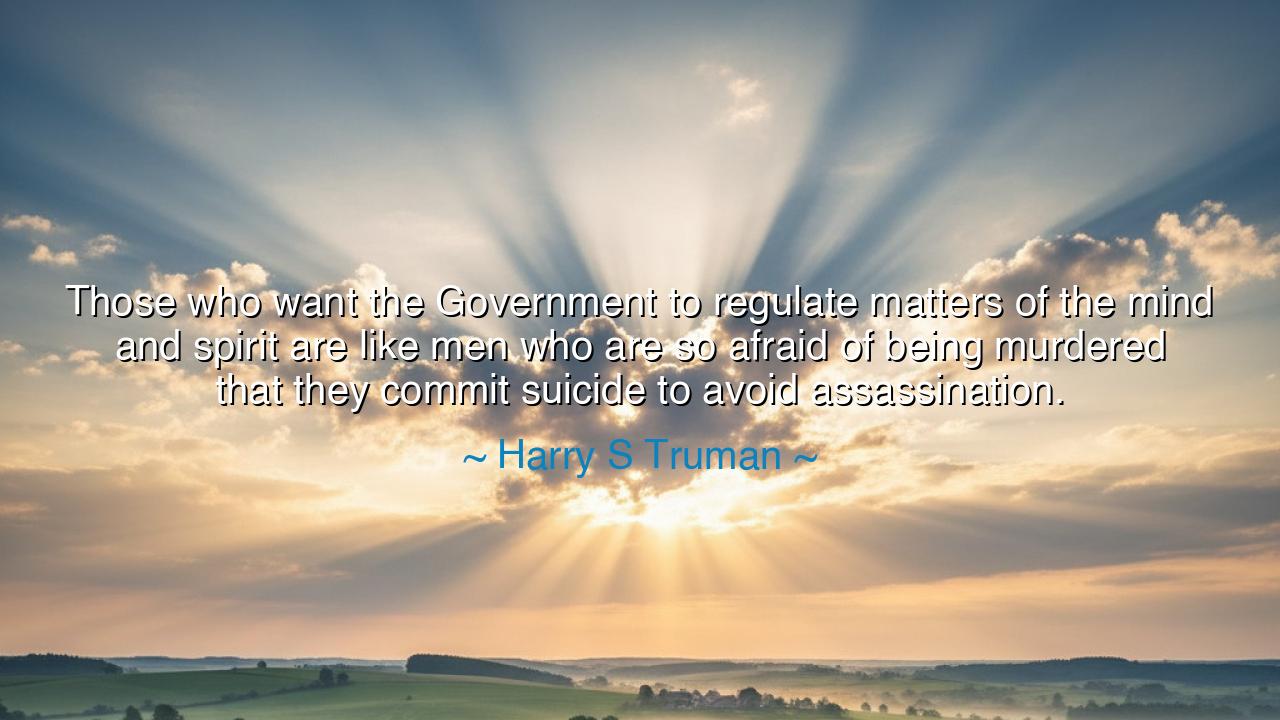
Those who want the Government to regulate matters of the mind and
Those who want the Government to regulate matters of the mind and spirit are like men who are so afraid of being murdered that they commit suicide to avoid assassination.






In an age shadowed by fear and conflict, when the minds of men trembled beneath the weight of ideology and suspicion, Harry S. Truman, the 33rd President of the United States, spoke words that burned with both reason and courage:
"Those who want the Government to regulate matters of the mind and spirit are like men who are so afraid of being murdered that they commit suicide to avoid assassination."
This quote, born in the tumult of the Cold War, was not uttered lightly. It was a warning against the slow poison of tyranny disguised as protection. In those years, the fear of communism ran deep — and in that fear, many were tempted to surrender their freedoms of thought and belief in exchange for safety. But Truman, who had seen the rise of dictatorships and the ruin of war, knew the truth: that when a nation allows the state to govern the mind and spirit, it has already slain the very soul it seeks to defend. His words were not merely political, but spiritual — a call to remember that liberty of thought is the heartbeat of a free people.
The meaning of Truman’s words cuts to the heart of the human condition. Fear, though natural, can become the greatest enemy of freedom. When people grow so terrified of danger — of crime, of heresy, of difference — that they beg the government to control what they think, read, or believe, they are not securing their lives; they are forfeiting them. For what is life without the power to choose one’s own ideas, to question, to wonder, to seek truth without permission? To live without freedom of mind is to exist in chains, even if the body walks unbound. Truman saw that the worst form of oppression is not the sword that strikes the body, but the law that binds the soul.
The origin of this insight can be traced to Truman’s steadfast belief in democracy as a moral trust. He had witnessed firsthand the devastation wrought by totalitarian regimes — from Nazi Germany to Stalinist Russia — where governments claimed to act for the “good” of the people but in truth sought to control every word, every thought, every dream. He knew that once a government assumes the right to regulate the inner life of its citizens, it no longer serves them; it owns them. His metaphor — of suicide to avoid assassination — was a masterstroke of irony. For what is the point of destroying liberty in order to preserve security? Such safety is an illusion, and such surrender is death by one’s own hand.
History itself offers us the grim examples Truman warned against. Consider the story of Soviet Russia under Stalin. In their quest to protect the revolution from enemies, the rulers began to purge every voice of dissent. Writers, thinkers, scientists, even peasants — all who thought differently — were silenced, imprisoned, or killed. Books were burned, art was censored, and the free exchange of ideas vanished. The state became not merely the ruler of bodies but the warden of minds. And though Stalin claimed to defend his nation from destruction, he achieved the opposite: he murdered the spirit of an entire generation. Thus, as Truman foresaw, in trying to protect itself from enemies of thought, the state destroyed the freedom that makes thought possible.
But the wisdom in Truman’s words does not belong only to his century. In every age, fear tempts the people to surrender their freedom to authority — fear of terrorism, of misinformation, of cultural change. Each time, the same argument is made: that freedom is dangerous, that control is necessary, that the government must protect minds for their own good. Yet every time, the result is the same: censorship masquerading as virtue, control disguised as care. The lesson is timeless — liberty cannot survive when comfort becomes the people’s highest god.
The truth Truman spoke is that freedom of mind is not a gift from the government; it is a right born with every human soul. It is not the task of rulers to dictate what men may believe, but to safeguard the space where belief itself can flourish. The duty of the people, in turn, is to guard that space with vigilance — to resist the seductive whispers of safety that demand the sacrifice of thought. For to think freely is to live fully, and to silence thought is to dig one’s own grave in the name of protection.
So let this teaching endure in the hearts of those who cherish liberty: fear must never rule reason, and governments must never rule the soul. Let every citizen, scholar, and believer remember that freedom’s first frontier lies within — in the courage to think, to question, to speak without fear. Do not commit the suicide of surrender to avoid the imagined assassination of danger. Stand boldly in truth, even when it trembles. For the mind, once enslaved, cannot be freed by law — only by courage.
Thus ends the teaching: freedom of the mind and spirit is the breath of civilization. Protect it not by walls or chains, but by wisdom, vigilance, and the unyielding conviction that no government, however noble its promise, should ever be the master of the human soul.






AAdministratorAdministrator
Welcome, honored guests. Please leave a comment, we will respond soon